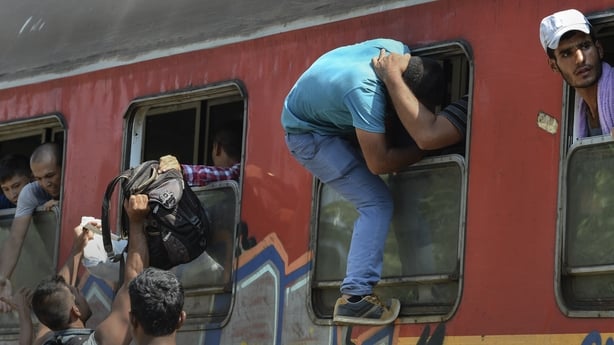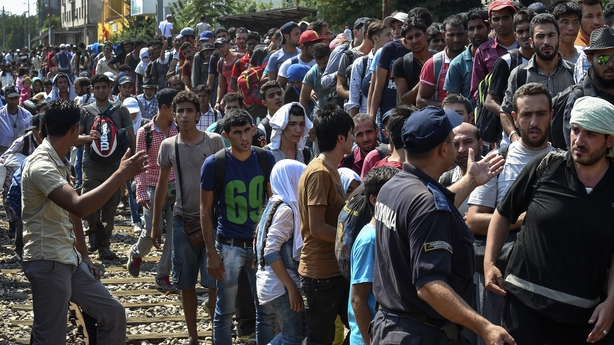Refugees and migrants are queuing to register and board the Eleftherios Venizelos ferry, a floating migrant centre docked at the Greek island of Kos.
Refugee and migrant families in Kos slept on the ground and gathered to wait outside the cruise ship Eleftherios Venizelos this morning.
The huge passenger ship docked on the Greek island yesterday to serve as a floating reception centre and dormitory.
Greece is struggling to cope with tens of thousands of desperate migrants from the Middle East, Africa and Asia even as it seeks to avoid financial meltdown.
Kos, within sight of Turkish shores, has found itself on the front line of the crisis as new migrants arrive in rubber dinghies at the rate of hundreds a day.
The white-painted ANEK Lines vessel, paid for by the Greek government, will provide assistance exclusively to Syrians.
Authorities said people fleeing Syria's civil war would be treated as refugees but those of other nationalities, including Africans, Iraqis, Pakistanis and many others, were considered migrants.
Many of those arriving in Italy and Greece are intent on reaching northern Europe, and the priority of the authorities on Kos is to move them to other parts of Greece.
Police Major General Zacharoula Tsirigoti said 1,900 Syrians would leave last night on passenger ferries to Athens.
But the mayor said around 800 migrants were arriving each day on Kos, one of Greece's most popular holiday destinations. At least 4,000 are now camped out on the island.
Migrant, refugee chaos at a train station in Macedonia
Meanwhile, a Red Cross official has estimated that 2,000 people per day are crossing from Greece into Macedonia, up from 1,000 several weeks ago, and converging on the train station in the border town of Gevgelija.
Many are racing to Hungary before completion of a four-metre high fence along its border with Serbia at the end of August.

The fence, with its Cold War echoes in ex-communist eastern Europe, risks creating a bottleneck.
This year alone, 90,000 people have sought asylum in Serbia, thus avoiding arrest before continuing north to Hungary. The real number passing through is likely much higher.
Macedonia has said it is doing everything it can to deal with the problem, but as in Serbia, the scale of the crisis has already far outstripped the meagre resources of the ex-Yugoslav republic.
Beyond a couple of police officers, there was no sign of any official attempt to keep order at the train station yesterday and today as thousands tried to board the two or three international trains that pass through each day.

The platform has turned into an open-air market, with local Macedonians selling drinks, cigarettes and confectionery.
"I've been here nine hours and haven't eaten anything today. Shame on this country," said 27-year-old Aziz Hasoon, who said he was from Syria.
Hassan Ahmad, 50, from Damascus, said he had spent $16,000 since 23 July to get himself and his son this far, most of it going to smugglers and corrupt police officers.
Mr Ahmad said he had been kidnapped and tortured in Syria and forced to flee.
"There's no way for me to survive there," he said. "I left my wife to her family and my son left his fiance."
On Friday, a young boy was hospitalised, his face covered in blood, after he climbed an electricity pylon to spot an on comingtrain and was shocked by touching a live wire.
Gevgelija Mayor Ivan Frangov has said Macedonia and Serbia should consider building their own fences.
"This problem was not created by Macedonia or Gevgelija," he was quoted as saying by the Serbian state news agency, Tanjug.
"The problem is arriving through an EU member state, and that's Greece."
